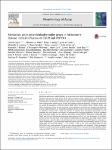Mendelian adult-onset leukodystrophy genes in Alzheimer's disease: critical influence of CSF1R and NOTCH3
Sassi, Celeste
Nalls, Michael A.
Ridge, Perry G.
Gibbs, Jesse R.
Lupton, Michelle K.
Troakes, Claire
Lunnon, Katie
Al-Sarraj, Safa
Brown, Kristelle S.
Medway, Christopher
Lord, Jenny
Turton, James
Bras, Jose
Passmore, Peter
Craig, David
Johnston, Janet
McGuinness, Bernadette
Todd, Stephen
Heun, Reinhard
Kölsch, Heike
Kehoe, Patrick G.
Vardy, Emma R. L. C.
Hooper, Nigel M.
Smith, A. David
Wilcock, Gordon
Warden, Donald
Holmes, Clive
Blumenau, Sonja
Thielke, Mareike
Josties, Christa
Freyer, Dorette
Dietrich, Annette
Hammer, Monia
Baier, Michael
Dirnagl, Ulrich
Morgan, Kevin
Powell, John F.
Kauwe, John S.
Cruchaga, Carlos
Goate, Alison M.
Singleton, Andrew B.
Guerreiro, Rita
Hodges, Angela
Hardy, John
Mendelian adult-onset leukodystrophies are a spectrum of rare inherited progressive neurodegenerative disorders affecting the white matter of the central nervous system. Among these, cerebral autosomal dominant and recessive arteriopathy with subcortical infarcts and leukoencephalopathy, cerebroretinal vasculopathy, metachromatic leukodystrophy, hereditary diffuse leukoencephalopathy with spheroids, and vanishing white matter disease present with rapidly progressive dementia as dominant feature and are caused by mutations in NOTCH3, HTRA1, TREX1, ARSA, CSF1R, EIF2B1, EIF2B2, EIF2B3, EIF2B4, and EIF2B5, respectively. Given the rare incidence of these disorders and the lack of unequivocally diagnostic features, leukodystrophies are frequently misdiagnosed with common sporadic dementing diseases such as Alzheimer's disease (AD), raising the question of whether these overlapping phenotypes may be explained by shared genetic risk factors. To investigate this intriguing hypothesis, we have combined gene expression analysis (1) in 6 different AD mouse strains (APPPS1, HOTASTPM, HETASTPM, TPM, TAS10, and TAU) at 5 different developmental stages (embryo [E15], 2, 4, 8, and 18 months), (2) in APPPS1 primary cortical neurons under stress conditions (oxygen-glucose deprivation) and single-variant–based and single-gene–based (c-alpha test and sequence kernel association test (SKAT)) genetic screening in a cohort composed of 332 Caucasian late-onset AD patients and 676 Caucasian elderly controls. Csf1r was significantly overexpressed (log2FC > 1, adj. p-value < 0.05) in the cortex and hippocampus of aged HOTASTPM mice with extensive Aβ dense-core plaque pathology. We identified 3 likely pathogenic mutations in CSF1R TK domain (p.L868R, p.Q691H, and p.H703Y) in our discovery and validation cohort, composed of 465 AD and mild cognitive impairment (MCI) Caucasian patients from the United Kingdom. Moreover, NOTCH3 was a significant hit in the c-alpha test (adj p-value = 0.01). Adult-onset Mendelian leukodystrophy genes are not common factors implicated in AD. Nevertheless, our study suggests a potential pathogenic link between NOTCH3, CSF1R, and sporadic late-onset AD, which warrants further investigation.
Files in this item

